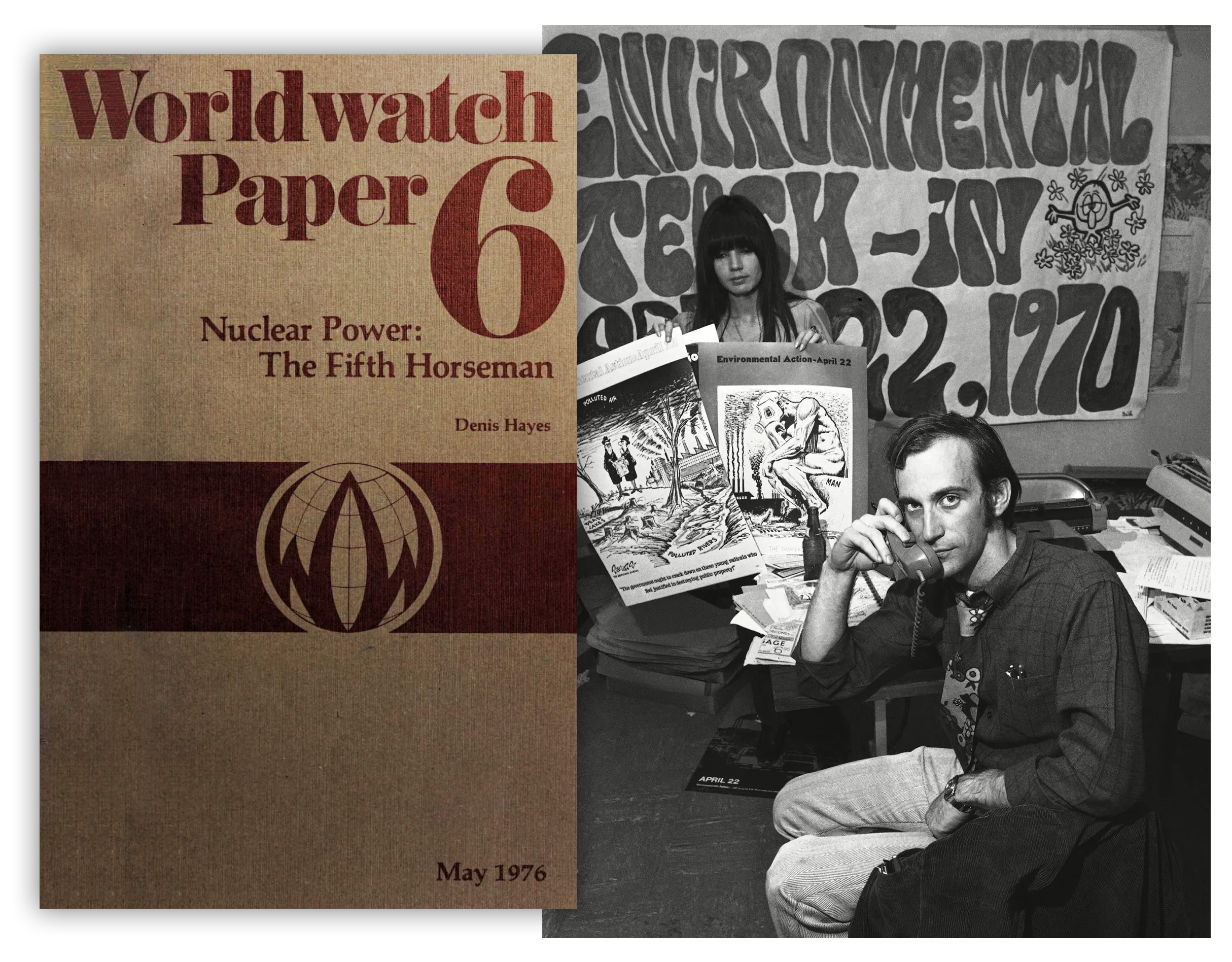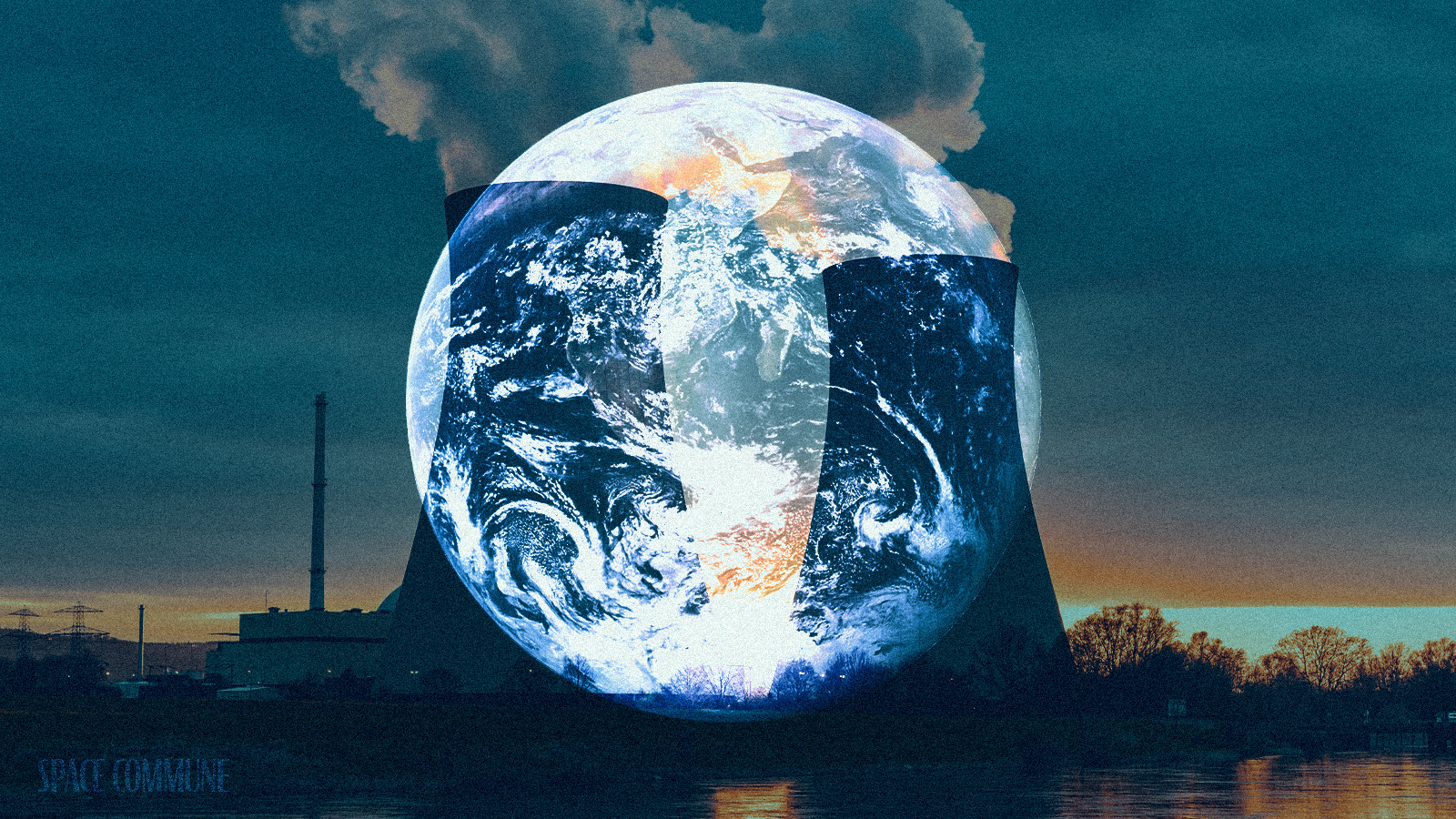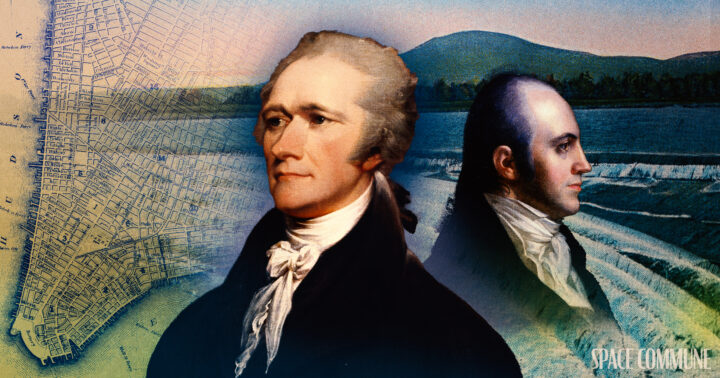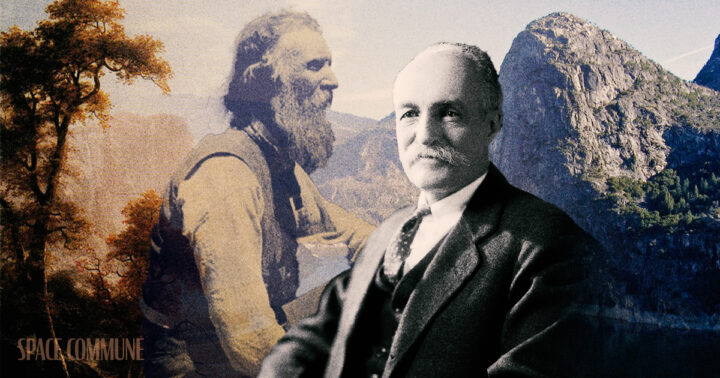Today is Earth Day, a “holiday” which started in 1970. Earth Day was first proposed in 1969 at a UNESCO conference in San Francisco, originally planned for the spring equinox (March 21), but later set for April 22, 1970, a month later. US Wisconsin Senator Gaylord Nelson proposed a nationwide environmental teach-in, modeled after the popular anti-war teach-in, which would kick off the first official Earth Day national event. Nelson tapped young activist Denis Hayes as National Coordinator for what became a massive, historic event. It’s reported that more than 20 million people participated and is considered the largest single-day protest in human history.
Earth Day is an anti-nuclear energy, neo-Malthusian holiday
The first Earth Day in 1970 was a watershed moment for the environmental movement, which had been ramping up in the 1960s due to influencer authors such as Rachel Carson (Silent Spring, 1962) and Paul Ehrlich (The Population Bomb, 1968) whose books were chalk full of sensationalized and titillating dystopian science fiction about a future without birds, trees, rivers and streams. On the surface, the event was primarily about anti-pollution sentiment, an idea that hardly anyone could argue against, but the event’s subheadings revolved around ideas like “overpopulation” and anti-nuclear activism. The effort to link nuclear energy technology with war and pollution was overt.
Ephemera from Earth Day and the new booming environmental movement boasted slogans like “hell no, we won’t glow,” “slow growth now,” “uranium, leave it in the ground,” “the earth is our mother, no nukes,” “dykes opposed to nuclear technology,” “split wood not atoms,” “stop heir pollution, two children are enough.” Being opposed to pollution became inextricably linked with being both anti-population growth and anti-nuclear energy.

In 1975, Denis Hayes, the National Coordinator for the first Earth Day wrote a book titled Nuclear Power: The Fifth Horseman, echoing the same anti-nuclear energy talking points as famous ecological movement books The Population Bomb (Ehrlich 1968), Small is Beautiful (Schumacher 1973) and The Poverty of Power (Commoner 1976); that nuclear energy is too dangerous, both ecologically, socially and geopolitically. In it, Hayes firmly equates nuclear energy with nuclear weapons:
Acceptance of nuclear technology amounts to acceptance of the inevitable spread of nuclear weapons from nation to nation, and the near-certainty that some nuclear bombs will end up in terrorist hands. The debate is not whether nuclear power will lead to nuclear weapons; that is beyond question. What is unknown is who will control these bombs, how they will be used, and what their use will portend for even the most stable institutions.
In the text of the book, Hayes rattles off all kinds of examples and explanations, which in modern hindsight would be seen as pure fear-mongering, debunked factoids or engineering problems which have long been overcome. He concludes with the same rhetorical weapon we see leveraged in full force to this day. The only way mankind can benefit from technology (in this case nuclear energy) is to surrender full control to “authoritarian” powers that be, reemphasizing the false dichotomy that oligarchs have been shoving down our throats for centuries: live free as primitive peasants off the land, or capitulate to the one world government (live in the pod and eat zee bugs!)
Increased deployment of nuclear power must lead to a more authoritarian society. Reliance upon nuclear power as the principal source of energy is probably possible only in a totalitarian state.
In a world where money is power, these same large investments will cause inordinate power to accrue to the managers of nuclear energy.
These managers will be a highly trained, remote, technocratic elite, making decisions for an alienated society on technical grounds beyond public knowledge. C.S. Lewis has written that, “what we call Man’s power over Nature turns out to be a power exercised by some men over others with nature as its instrument.”

If you are someone who considers yourself anti-Malthusian, Promethean, pro-nuclear, or just plain pro-humanity, there is no reason to celebrate Earth Day, it is a fundamentally Malthusian holiday, which took the neo-Malthusian movement mainstream.
What if we claim Earth Day for Prometheans?
If there is one thing the eco-Malthusians have going for them, it’s that nature is just about universally treasured. It is an uphill battle to reject a holiday, which on its face, builds off a very agreeable notion – that Earth and nature is worth our reverent stewardship. Many environmental groups are popping up in support of nuclear energy as a pro-environment solution. But if we do not look at the historical context of this movement from all angles (geopolitical, philosophical, and propagandistic) we will repeat the same mistakes of the 1960-70s, which saw Eisenhower’s ‘atoms for peace’ turn into ‘split wood not atoms’.
Late last year at COP28, the G7 bloc declared they would “triple their nuclear capacity by 2050” in an effort to reach “Net Zero” carbon emissions. Celebrities who have previously railed against nuclear power, are suddenly in favor of it. It seems that the environmentalists are finally beginning to come to their senses and pro-nuclear advocates in the west are prematurely taking a victory lap. Earth Day and nuclear energy now appear to be simpatico.
The problem is that Western pro-nuke movement is not taking stock of how nuclear energy is being used. The reason the anti-nuclear movement gained so much traction in the mid-century was because this revolutionary energy source was being used for the most vitriolic evil mankind had ever taken part in – the atomic bomb. This bomb did not only fuel war and death, it fueled fear of atomic energy. Today we are faced with the same dilemma. Are we bombing people with atomic energy? Not quite yet (though the powers that be have come way too close to making that horrific scenario a reality.) But a more covert, psychological warfare continues to brew, full force as it has been since the end of WW2. And with the newly emerging Artificial Intelligence technology, psychological and informational warfare has ramped up to a new pace.
Bill Gates and Warren Buffett, who have previously funded philanthropic efforts to bar civilian nuclear energy from being built, are now moving forward with Small Modular Reactors to power data centers. In an interview last week Mark Zuckerberg talked about the ‘energy bottleneck’ issue as the major impediment for exploding AI technology. And as my friend Emmet Penney once said, Amazon’s real business isn’t making sure that you get your shitty sneakers on time, it’s computing for the Department of Defense.
Why has the G7 suddenly embraced nuclear energy again? The private corporate giants make it quite clear that they are not interested in nuclear energy for public benefit, to build infrastructure, and job-creating industrial manufacturing capacity. In fact, that would not be very ecological of them, as we all know, factories and roads pollute! Perhaps the Malthusian agenda has finally made peace with nuclear energy. And in fact, nuclear energy is once again being used for the war machine, but this time for informational warfare and computational might, rather than vulgar atomic bombs!
The truth is Earth Day is still very much a Malthusian holiday, with or without nuclear energy. I am a huge supporter of nuclear energy because it poses so much potential for peaceful development and human flourishing. But I do not support its use to perpetuate war for the sake of a cruel supranational oligarchy that fears the rise of a multipolar world, bringing a new paradigm of peace through development. Can we claim Earth Day for Prometheans? I’m not sold on it yet. But we can stand firm in our anti-Malthusianism and refuse to surrender nuclear energy to the people who want to use it to reduce the human population.





